Elon Musk to expand Tesla gigafactory rocked by Left-wing protests

Elon Musk’s Tesla has been given the green light to expand its Berlin gigafactory despite environmental activists taking part in huge protests at the plant last week.
The local council in Gruenheide, the Brandenburg municipality where the Berlin factory is based, voted 11 to six to allow the company to expand the facility, Tesla’s only European plant.
The decision comes three months after local residents voted to block the expansion, which prompted Tesla to submit a scaled-down plan.
The referendum was non-binding but the company had promised to revise its plans after the vote.
Tesla’s Berlin gigafactory has become a hotspot for environmental and Left-wing protests in recent months, which culminated last week in scores of activists breaking through police lines to reach the walls of the facility.
Several weeks earlier, the factory’s power supplies were vandalised, forcing it to stop production.
A majority of councillors in Gruenheide voted in favour of the expansion plan, which is roughly half the size of Tesla’s previous proposal to clear around 250 acres of forest. The company hopes to double production to around 1m cars per year.
The meeting featured demonstrations outside the local parliament, while those attending the meeting had their bags checked at the door amid a police presence.
The expansion will still have to be approved by local environmental regulators and could be subject to legal challenges. It includes connecting the factory to a local train route to ease traffic congestion.
Despite Tesla spearheading the electric car movement, many of the eco-activists have rejected car ownership altogether. They have claimed Tesla’s facility is polluting local water supplies and others oppose Mr Musk, the world’s third-richest person, as a symbol of capitalism.
The approval vote was welcomed by Tesla and local politicians, including Brandenburg’s economics minister Jörg Steinbach, who said: “I am convinced that your decision is in the interests of your community.”
However, the “Turn Off the Tap to Tesla” alliance, which has been marshalling protests, said it would continue to demonstrate against the company.
Tesla’s Berlin factory was opened in 2019. The recent disruption to power supplies as well as shipping delays due to attacks in the Red Sea have slowed production in recent months.
Read the latest updates below.
06:00 PM BST
Signing off...
Thanks for joining us today on the Markets blog. We’ll be back on Monday to cover the news in the markets but I’ll leave you with news that the proposed Royal Mail takeover is to face national security scrutiny. Tim Wallace reports:
The Czech billionaire Daniel Kretinsky’s £3.5bn bid for Royal Mail will be scrutinised to ensure it does not threaten national security, Jeremy Hunt has said.
Mr Hunt, the Chancellor, said it is vital there are “no risks” to “core infrastructure” when asked by The Telegraph about Mr Kretinsky’s plan to purchase the postal service’s parent company International Distributions Services (IDS).
He said: “We do always look at national security considerations and make sure that, in terms of our core infrastructure, there are no risks to those going forward, and any bid for Royal Mail would go through that normal process.”
IDS’s board has said it is minded to accept the offer by Mr Kretinsky, known as the Czech Sphinx for his inscrutable manner.
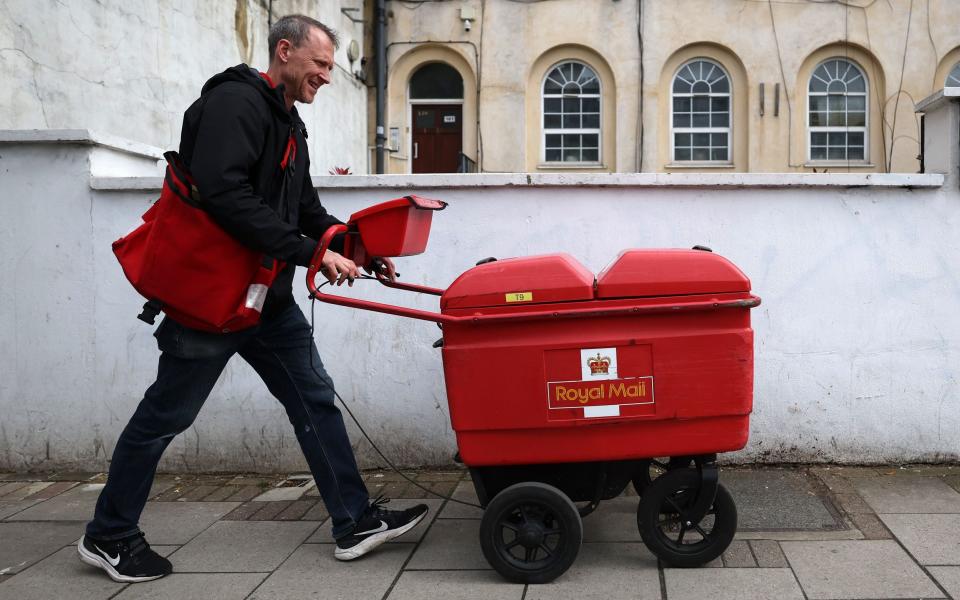
05:54 PM BST
M&S chairman hits out at British Airways after string of flights cancelled
The chairman of Marks & Spencer has hit out at British Airways, saying it was “sad to see a great airline deteriorate” after a series of flight issues. Hannah Boland reports:
Archie Norman criticised the company in a post on X, formerly known as Twitter, claiming his flight had been “cancelled then delayed” for the third time this year. He later deleted his post.
However, Mr Norman’s assessment is likely to rankle given the M&S chairman’s stature in the business world. The City grandee is renowned for turning around underperforming businesses. He is credited with a revival at Asda while chief executive in the 1990s and is overseeing the current improvement at M&S.
His criticism of BA came as the airline faced disruption on Friday morning caused by bad weather.
A spokesman for British Airways said: “Like all airlines, due to restrictions imposed by Air Traffic Control at Heathrow Airport as a result of poor visibility, we’ve made some adjustments to our schedule.
“We’ve apologised to our customers for the disruption to their travel plans and our teams are working to get them to their destinations as quickly as possible.”
Mr Norman is the latest high-profile figure to complain of issues with the airline.
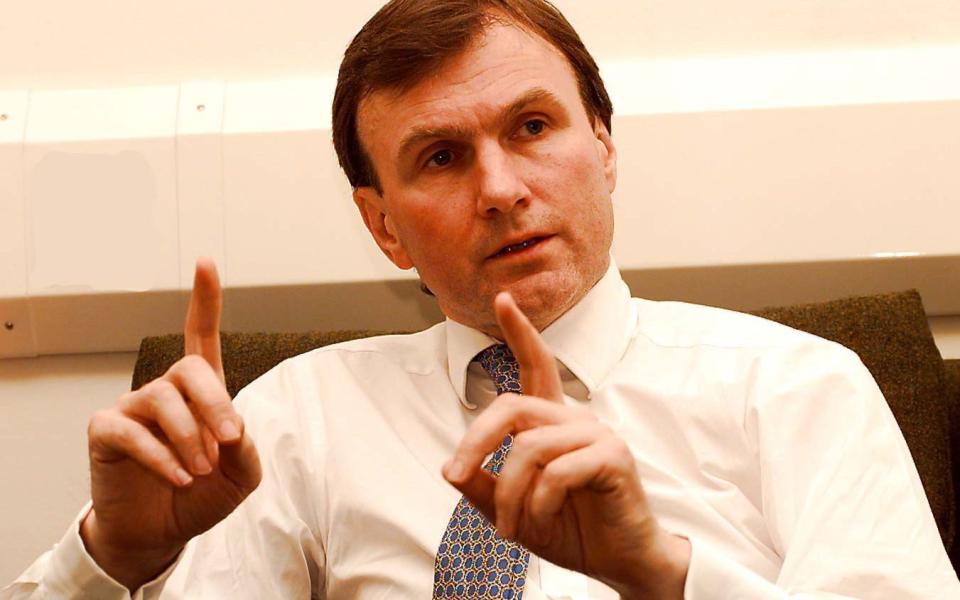
05:25 PM BST
Canada’s intelligence chief warns that China can use TikTok to spy on users
The head of Canada’s Security Intelligence Service (CSIS) has warned against using the video app TikTok, saying data gleaned from its users “is available to the government of China”.
David Vigneault, the CSIS director, told Canada’s CBC News: “My answer as director of the Canadian Security Intelligence Service (CSIS) is that there is a very clear strategy on the part of the government of China to be able to acquire personal information from anyone around the world.”
A TikTok spokesman said:
These assertions are unsupported by evidence, and the fact is that TikTok has never shared Canadian user data with the Chinese government, nor would we if asked.
CSIS’s own annual report notably makes no mention of a specific risk from TikTok, but it does reference a number of other platforms that have been used by foreign actors to target Canadians ...
Singling out one platform and making unsupported accusations does not make Canadians safer.
In September, Canada ordered a national security review of a proposal by TikTok to expand the short-video app’s business in the country. Mr Vigneault said he will take part in that review and offer advice, CBC reported on Friday.
Earlier this month, TikTok and its Chinese parent company ByteDance began legal proceedings in a US federal court seeking to block a law signed by President Joe Biden that would force the divestiture of the short video app used by 170 million Americans or ban it.
The law, signed by Mr Biden on April 24, gives ByteDance until January 19 to sell TikTok or face a ban. The White House has said it wants to see Chinese-based ownership ended on national security grounds but not a ban on TikTok.
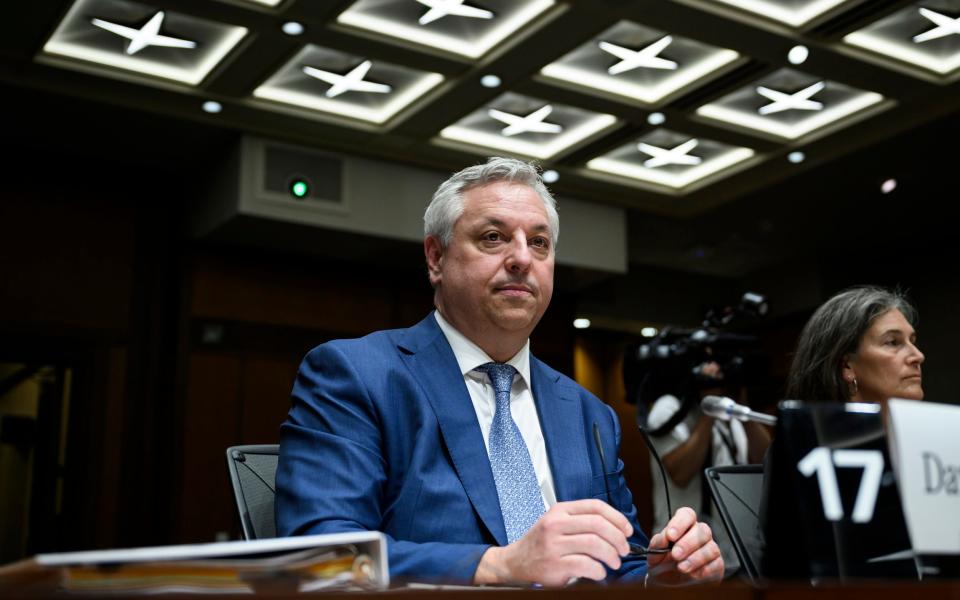
05:25 PM BST
Elon Musk to expand Tesla gigafactory rocked by Left-wing protests
Elon Musk’s Tesla has been given the green light to expand its Berlin gigafactory despite environmental activists taking part in huge protests at the plant last week. James Titcomb reports:
The local council in Gruenheide, the Brandenburg municipality where the Berlin factory is based, voted 11 to six to allow the company to expand the facility, Tesla’s only European plant.
The decision comes three months after local residents voted to block the expansion, which prompted Tesla to submit a scaled-down plan.
The referendum was non-binding but the company had promised to revise its plans after the vote.
Tesla’s Berlin gigafactory has become a hotspot for environmental and Left-wing protests in recent months, which culminated last week in scores of activists breaking through police lines to reach the walls of the facility.
Several weeks earlier, the factory’s power supplies were vandalised, forcing it to stop production.
A majority of councillors in Gruenheide voted in favour of the expansion plan, which is roughly half the size of Tesla’s previous proposal to clear around 250 acres of forest. The company hopes to double production to around 1m cars per year.
The meeting featured demonstrations outside the local parliament, while those attending the meeting had their bags checked at the door amid a police presence.
The expansion will still have to be approved by local environmental regulators and could be subject to legal challenges. It includes connecting the factory to a local train route to ease traffic congestion.
04:58 PM BST
‘Foolish’ government policies preventing energy bills from falling further, says energy analyst
The Government made “a hash” of energy policy and forced customers to pay for this in their energy bills, according to Andy Mayer, an energy analyst at the Institue of Economic Affairs. He told The Telegraph:
While falling energy prices are, of course, welcome, it is important to note that they would have fallen much further had the Government not made such a hash of energy policy and loaded customer bills with the costs of their failure.
The price cap caused dozens of retail energy companies to fail, the costs of the bailouts are included in everyone’s bills.
Falling oil and gas prices exposed the 2022 lie that renewables were cheap. The subsequent collapse of the auctions was followed by the Government locking in higher prices for years to come.
Add to this the expansion of the power grid, plans for boiler taxes, and heat pump targets and it is clear we should not be cheering what is mostly the result of global commodity trends - trends from which we do not fully benefit given the foolish decision to ban fracking and cripple North Sea investment with high taxes.
04:57 PM BST
Footsie closes down
The was a bit more action among shares in London today compared with New York. The FTSE 100 closed down 0.22pc. The biggest riser was mining company Antofagasta, up 3.6pc, followed by another miner Fresnillo, up 3.4pc. The biggest faller was gambling company Entain, down 5.5pc, followed by equipment rental company Ashtead, down 4.5pc.
Meanwhile, the FTSE 250 dropped 0.35pc. The biggest riser was Hochschild Mining, up 5.7pc, followed by Mr Kipling owner Premier Foods, up 3.7pc. Wizz Air was the biggest faller, down 4.5pc, followed by Savills, down 4.3pc.
04:45 PM BST
Wall Street takes a breather after rally from interest rate hopes
Wall Street’s main indexes were little changed on Friday as investors took a breather from the week’s rally driven by growing expectations of U.S. interest-rate cuts this year.
The S&P 500 and Nasdaq were on course for a fourth straight week of gains, while the blue-chip Dow was on track for its fifth weekly advance, supported by strong quarterly results and slowing inflation data that has bolstered the case for rate cuts from the Federal Reserve.
All three main indexes touched record highs on Thursday and the Dow Jones briefly crossed the highly symbolic 40,000 milestone, before reversing gains and closing in the red.
Robert Pavlik, senior portfolio manager at Dakota Wealth, said that shares “are just trying to sort of digest the past week’s economic data”. He added:
People are now looking at the next catalyst. Most likely it’s going to be whether or not the Fed actually cuts. So you got PCE [personal consumption expenditures data] coming up, and if that’s below expectations then probably see the market continue to trend higher.
Traders currently see a 68pc chance of the first rate cut in September, according to the CME FedWatch Tool.
04:26 PM BST
Renewables are the answer to cheaper energy bills, says Left-leaning think tank
We’ve heard from Madsen Pirie of the Adam Smith Institute who is pro-fracking. But Maya Singer Hobbs, senior research fellow at the IPPR, a think tank much favoured by the Labour party, has a difference take. She told The Telegraph:
The only way to ensure bills go down and remain down is to invest in renewable energy production here in the UK. This will reduce our vulnerability to external shocks and renewables are pound for pound cheaper than fossil fuels.
Likewise, we need to fix the UK’s old, damp and energy inefficient housing stock by retrofitting our nations home with heat pumps and better insulation.
03:58 PM BST
Don’t worry about Chinese batteries, worry about renewables, says expert
China’s electric car battery breakthrough, reported today, should be welcomed, but the West has another serious problem, a leading researcher on economic growth has said.
Marian Tupy of the Cato Institute in Washington DC and author of Superabundance told The Telegraph:
Assuming that the Chinese claims are true, the new battery should be welcome news to all who seek to reduce CO2 emissions.
Those concerned about the Chinese manufacturing prowess should not be too worried. Innovation is a dynamic process that will allow non-Chinese companies to learn from the Chinese breakthrough and improve upon it.
A much more serious problem is Western electricity production.
Cheap and efficient batteries, after all, still need to be charged by clean electricity that wind and solar cannot currently provide in sufficient quantities.
Expansion of natural gas and nuclear fission power plants, therefore, should still be a priority for Western decision-makers.
03:51 PM BST
China’s new battery technology will be used by military, warns expert
We reported earlier that China has developed a revolutionary car battery that can charge in just 10 minutes and power a car for hundreds of miles before it needs to be plugged in.
Shane Mason, a defence industry strategist who has worked for two of Britain’s biggest defence companies, told The Telegraph:
China’s new battery technology is going to propel growth in the country but almost certainly also be used for some sort of military application.
This means that China is playing ‘Go’ – arguably a simpler game but more difficult to read - while the West is playing ‘Chess’, and waiting for a big move.
This model worked when the West was in a much more powerful position in the world order where nations had to anticipate our next moves. In the current climate, we need to be responding far quicker.
03:42 PM BST
Cut energy bills further by rejecting pressure group politics, urges economist
The Government should push energy prices down by standing up to green pressure groups, an economist has said.
Madsen Pirie, president of the Adam Smith Institute, told The Telegraph:
Even though energy bills are falling, they are still too high, and higher than they need be because of government policies. The price cap on gas discourages the investment that could bring new supplies on line. The aim for net zero imposes the cost of more expensive renewables.
But by far the most adverse policy is the effective ban on fracking. There is a huge store of cheap energy under our soil which is far less polluting than coal or oil, and which could be extracted to reduce all our bills and leave the UK less dependent on sometimes unreliable foreign sources. It is the height of folly that we allow pressure groups to deny us access to that wealth of energy
03:36 PM BST
Linklaters hikes newly qualified lawyer salaries to £150,000
Linklaters has become the latest City law firm to hike salaies in a so-called “war for talent”.
The firm’s newly qualified salary has been raised from from £125,000 to £150,000.
Trainee salaries increased from £50,000 to £56,000 for those in their first year of training, and from £55,000 to £61,000 for year two trainees. Solicitor apprentices salaries increased from £25,000 to £28,000.
The salary rise, first reported by the FT, follows news that rival Freshfields Bruckhaus Deringer had also hiked newly qualified lawyer salaries to £150,000.
Paul Lewis, Firmwide Managing Partner, said:
We are committed to rewarding our people competitively in our market. Our salary changes reflect this and enable us to attract and retain exceptional lawyers to provide the highest quality service to our clients.
03:30 PM BST
Handing over
That is all from me for this week. Alex Singleton will make sure you have latest updates as you head towards the weekend.
I will leave you with these stunning images of cotton picking in Australia, where the competition watchdog has raised concerns about the possible impact of a merger between traders Louis Dreyfus, known as LDC, and Namoi Cotton.
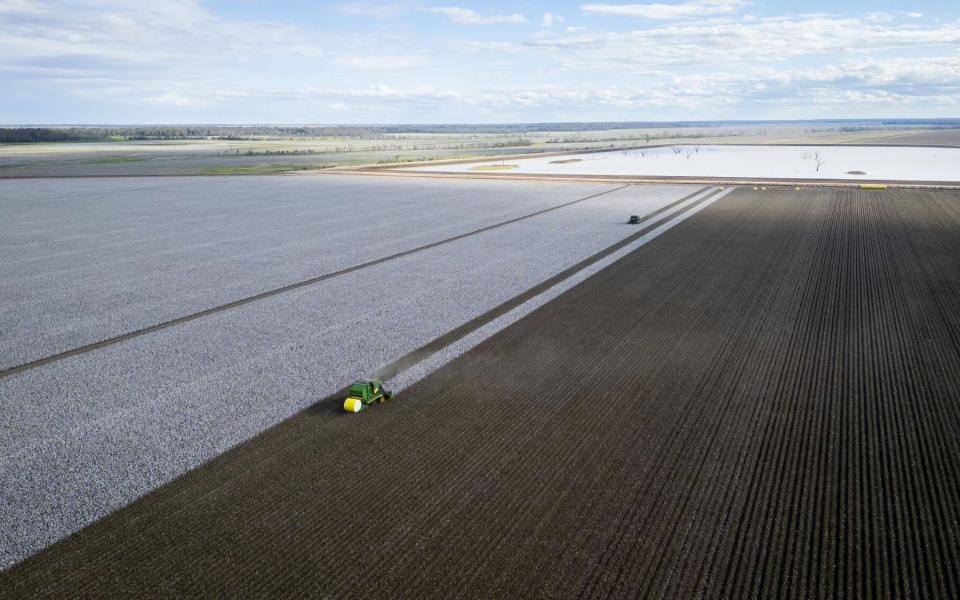
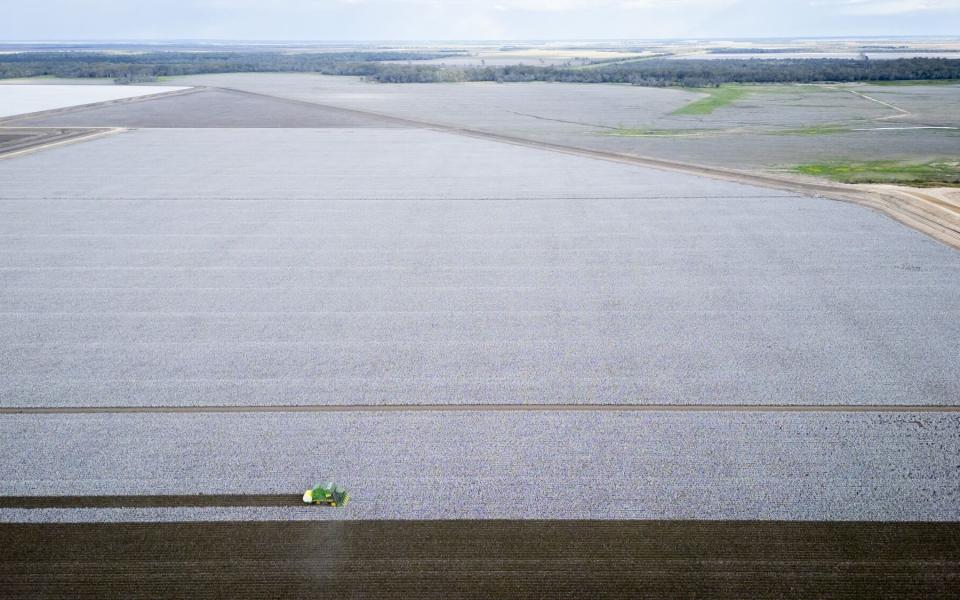

03:16 PM BST
FTSE 100 on track for weekly loss
The FTSE 100 is on course for a fall this week after nearly a month of gains that has seen it hit record highs.
The UK’s benchmark index was down 0.1pc on the day and by about 0.2pc on the week.
The domestically-focused midcap FTSE 250 is down 0.3pc on the day but is on track for a fourth consecutive week of gains.
Meanwhile, US stocks are drifting near their records as Wall Street heads for the finish of another winning week.
The S&P 500 was basically flat in morning trading and on track for a fourth straight week of gains. The Nasdaq Composite was also virtually unchanged.
The Dow Jones Industrial Average was up 57 points, or 0.1pc, a day after briefly topping the 40,000 level for the first time.
02:53 PM BST
China develops revolutionary electric car battery that can charge in 10 minutes
China has developed a revolutionary car battery that can charge in just 10 minutes and power a car for hundreds of miles before it needs to be plugged in.
Our energy editor Jonathan Leake has the details:
A report from the International Energy Agency (IEA) has hailed “remarkable” developments in chemistry that have allowed China to develop new batteries that pack far more energy than existing technologies.
The IEA highlighted EV batteries capable of travelling 250 miles without a recharge. Newer versions announced since the report was written can manage 600 miles.
However, the agency raised the alarm about China’s increasing dominance of the supply of vital materials needed to build batteries. The country’s stranglehold on supply chains means net zero rollouts globally could be disrupted by “extreme weather, trade disputes or geopolitics”.
This chart shows how China dominates the battery supply chain.
02:36 PM BST
Wall Street edges higher amid rate cut hopes
The main US stock indexes opened slightly higher and are heading for weekly gains on growing expectations of US interest rate cuts this year.
The Dow Jones Industrial Average rose 42.34 points, or 0.1pc, at the open to 39,911.72.
The S&P 500 opened higher by 6.00 points, or 0.1pc, at 5,303.10, while the Nasdaq Composite gained 10.17 points, or 0.1pc, to 16,708.49 at the opening bell.
02:25 PM BST
Silver hits highest price in a decade
The value of silver has hit its highest level in a decade as investors seek out precious metals.
Spot silver broke $30 an ounce for the first time since 2013, having soared by 28pc this year.
The price of gold has risen by more than 16pc so far this year as it surged to record highs.
Official figures show China and Turkey have been stockpiling gold since the start of the year.
02:18 PM BST
Households face ‘ongoing challenges’ despite expected fall in energy bills
Ofgem will announce the energy price cap for July to September on May 24.
Craig Lowrey, principal consultant at Cornwall Insight, which predicts average annual bills will fall to £1,574 a year from that date, said:
Our projections suggest that from July, the average annual bill will fall by around £500 compared to last summer, offering further relief given the quarter-on-quarter drop seen in April.
Of course, we must recognise lower prices don’t erase all the problems.
The very fact we are still seeing bill levels which are hundreds of pounds above pre-crisis levels underscores the ongoing challenges faced by households.
01:52 PM BST
M&S chairman hits out at British Airways after string of flights cancelled
The chairman of Marks & Spencer has hit out at British Airways, saying it was “sad to see a great airline deteriorate” after a series of flight issues.
Our retail editor Hannah Boland has the details:
Archie Norman criticised the company in a post on X, formerly known as Twitter, claiming his flight had been “cancelled then delayed” for the third time this year.
Mr Norman’s assessment is likely to rankle given the M&S chairman’s stature in the business world. The City grandee is renowned for turning around underperforming businesses, credited with a revival at Asda while chief executive in the 1990s and overseeing the current improvement at M&S.
His criticism of BA comes after recent figures revealed that the airline was one of the UK’s worst for delays and cancellations.
Read how BA has been cancelling more flights than competitors.

01:36 PM BST
Energy bills to fall to lowest level in two years
Gas and electricity bills are expected to fall to their lowest level in more than two years as the energy crisis caused by Vladimir Putin’s decision to invade Ukraine fades.
Our energy editor Jonathan Leake has the details:
Energy bills should fall by around 7pc from July with the average dual-fuel household facing bills of £1,574 a year, according to the latest forecasts from analysts at Cornwall Insight.
The prediction would mean that tariffs would fall by £116 a year compared to the price cap announced in April - and would be at their lowest level since the price cap was set at £1,216 in the winter of 2021-2022.
It comes a week before the official quarterly price cap announcement from Ofgem, the energy regulator.
If predictions are correct, this would represent a 25pc drop over the past year, with prices around £500 a year lower than July 2023.
“Looking further ahead we forecast the cap will rise slightly in October before falling again in January 2025,” said Cornwall in a statement.
01:14 PM BST
GameStop shares plunge as reality catches up with memestock craze
GameStop shares plunged after the video game retailer revealed a fall in sales as the rally triggered by the memestock craze faced up with reality.
Shares sank by more than 20pc in premarket trading in New York after the company announced that sales in the first quarter were between $872m and $892m (£688m and £705m), down from more than $1.2bn (£948m) in the same period last year.
The stock soared by 179pc in a two-day frenzy and the start of the week but have suffered a sharp reversal of 43pc in the two days since - and are on track to fall even further, delivering heavy losses for investors who tried to buy in at the top of the craze.
Giacomo Pierantoni, head of data at Vanda Research, said: “It appears to me that the mini bubble is collapsing.”
The spike was triggered by the return to social media of Keith Gill, known as Roaring Kitty, who had inspired a frenzy of buying in the stock in 2021 as part of the so-called “memestock” craze designed to punish short sellers in stocks.
Short sellers placed bets on the value of stocks declining.
GameStop bosses have taken advantage of the sharp increase in its share price by announcing it may sell up to 45m of shares “at the market offering,” to inject cash into the business.
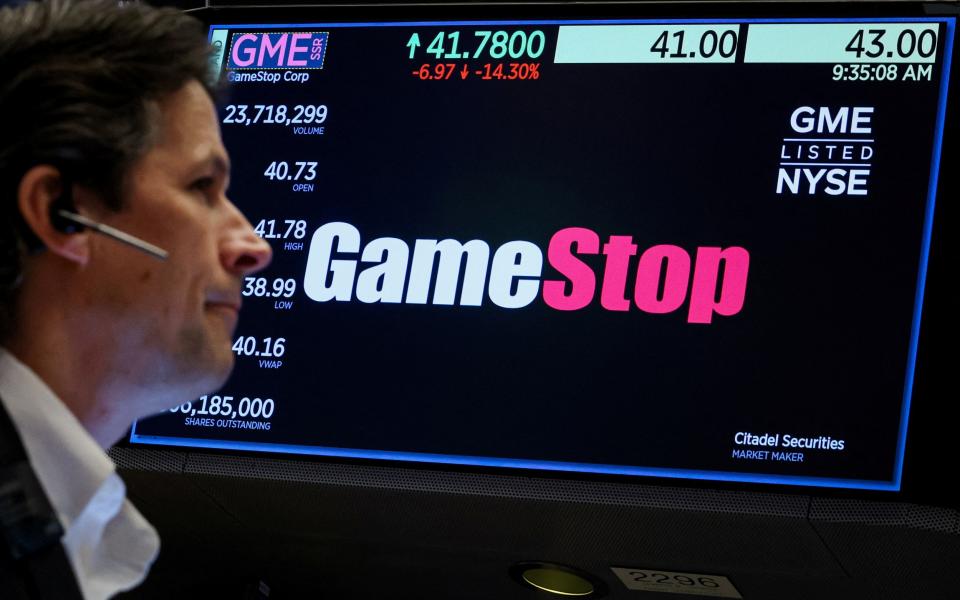
12:45 PM BST
Microsoft to avoid competition investigation over AI deal
Microsoft will not face a competition investigation over its decision to invest in a French artificial intelligence start-up championed by Emmanuel Macron.
The tech giant took a small stake in Paris-based Mistral in February, having also invested $13bn in ChatGPT maker OpenAI.
However, the Competition and Markets Authority said the tie-up “does not qualify for investigation”.
Microsoft’s investment in OpenAI is subject to a separate CMA review, although it has yet to launch a formal investigation.

12:26 PM BST
Thames Water is worthless, says biggest investor
Thames Water’s biggest investor has slashed the value of its stake in the company to zero in a move that renders the troubled supplier effectively worthless, The Telegraph can disclose.
Luke Barr has the exclusive:
The Canadian pension fund Omers said it has been forced into a “full write down” of its investment in Thames, a day after withdrawing its representative from the utility company’s board.
The write-down represents a complete loss for Omers, which valued its 31.7pc stake in Thames’ parent Kemble at £700m at the end of 2022.
Newly filed documents for a Singapore-registered entity owned by Omers reveal the investment giant’s latest position on Thames, which is racing to avoid a taxpayer-backed bailout.
Read how it’s stake in Thames Water was deemed worthless.
12:07 PM BST
Reddit surges after AI deal with ChatGPT owner
Internet forum Reddit has surged in premarket trading in New York after it announced a partnership with ChatGPT maker OpenAI.
The deal will see the chatbot get access to the social media site’s content while also bringing AI tools to the platform.
Reddit said the deal, and the resulting boost in its ability to use large language models, machine learning and artificial intelligence, would allow it to “improve the user experience for everyone”.
The two companies confirmed the deal would see OpenAI bring Reddit content to ChatGPT and “new products”, and would help users discover and engage with Reddit communities by showing them Reddit content, particularly on recent topics sparking discussion on the site.
Reddit shares were up 15pc ahead of the opening bell.

11:57 AM BST
Wall Street subdued after week of records
US stock indexes were muted in premarket trading after a week of sharp Wall Street gains amid hopes of Federal Reserve interest rate cuts.
All three main indexes had touched record highs on Thursday and the Dow briefly crossed the 40,000 milestone, before reversing gains and closing in the red.
Nevertheless, the S&P 500 and Nasdaq were set for their fourth straight week of gains, and the blue-chip Dow was on track for its fifth weekly advance, supported by strong quarterly results and slowing inflation data.
Investors will be listening to speeches later by Fed officials Christopher Waller and Mary Daly.
Traders currently see a 70pc chance of the first rate cut in September, according to the CME FedWatch Tool.
In premarket trading, the Dow Jones Industrial Average and S&P 500 were flat, while the Nasdaq 100 was up 0.1pc.
11:23 AM BST
Water boss defends £3.2m pay packet
A water company boss has defended her £3.2m pay packet despite the number of sewage spills increasing by a third in the last year.
Severn Trent chief executive Liv Garfield, who has earned nearly £13m over the past four years, said her pay had been performance related.
Severn Trent was responsible for more than 60,000 sewage spills last year.
In February the company was fined more than £2m for allowing huge amounts of raw sewage to discharge into the River Trent between 2019 and 2020.
She told BBC Radio 4: “During that period of time we’ve been the best rated company across the piste, whether it is by the Environment Agency on our environmental record, Ofwat in terms of our service performance, whether it’s investors putting cash in. We have had the second lowest bill.”
She added that Severn Trent has “made massive progress on river quality”.
11:04 AM BST
Pound on track for gain this week
Sterling was on track for a weekly gain against the dollar as traders upped bets on US interest rate cuts.
The pound edged down 0.1pc on the day to $1.266, but was on track for a weekly gain of 1pc. Against the euro, it gained 0.1pc at just under 86p.
Data this week showed that British wages grew by more than expected in the first three months of the year.
Next week will be crucial as it includes closely-watched consumer price index inflaiton figures.
Money markets are pricing in around a 55pc chance of a rate cut in June, according to LSEG data.
10:46 AM BST
Musk wins approval to expand Tesla Berlin factory despite arson attacks
Elon Musk has won approval for his plans to expand the grounds of Tesla’s first plant in Europe despite the proposal leading to arson attacks earlier this year.
Local councillors in the Gruenheide area just outside Berlin voted by 11-6 on Thursday evening in favour of the plan, German news agency dpa reported.
Activists have been protesting in a forest near the plant since February over concerns about water and deforestation.
Hundreds of activists overwhelmed police and stormed the factory site last week and Tesla was forced to suspend production at the factory in March after an arson attack cut off power to the facility as well as local homes and a hospital.
Hours before the council meeting, a court ruled that police cannot clear away tree houses that activists have built in the area for now.
The Tesla proposal was scaled down to involve the felling of fewer trees than originally intended.
Tesla wants to add a freight depot and logistical space to its factory, which opened in 2022.
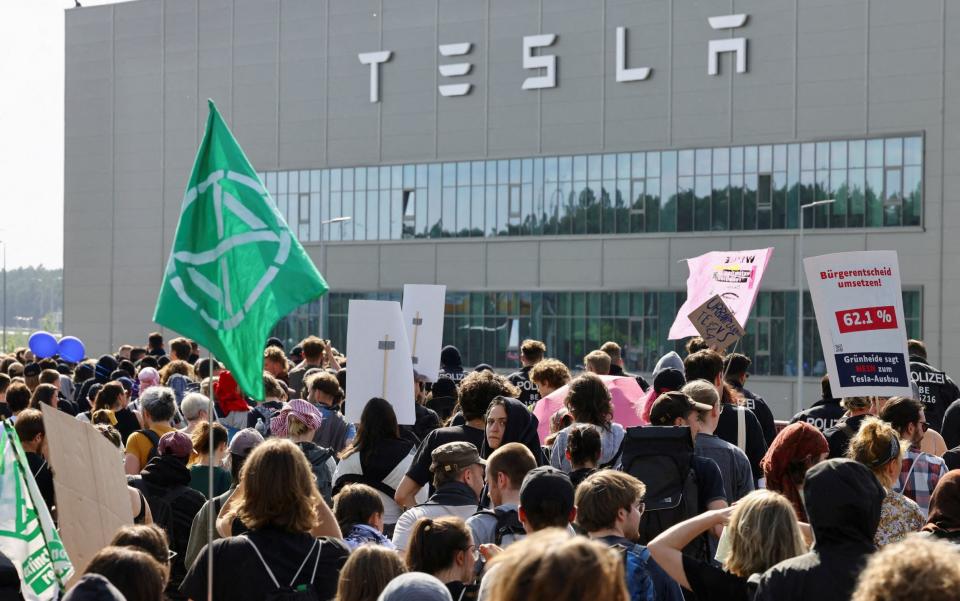
10:37 AM BST
Oil on track for weekly gain as inflation eases
Oil is on track for a modest weekly gain amid signs US inflation could be easing.
Brent crude, the international benchmark, 0.1pc higher near $84 a barrel after a two-day advance that saw it rise about 1pc.
US-produced West Texas Intermediate was flat at $79.
Prices have been supported by lower US stockpiles and signs that American inflation could be cooling.
However, the International Energy Agency said this week that there is a weaker outlook for growth in demand.
10:10 AM BST
Eurozone inflation steady at 2.4pc
Inflation was unchanged in the eurozone last month, official figures show, despite an uptick in Germany.
The consumer prices index for the single-currency area stood at 2.4pc in April, the same as March, even as the measure rose slightly from 2.3pc to 2.4pc in its largest economy.
Money markets indicate there is a 96pc chance that the European Central Bank will cut interest rates from their record high of 4pc at its next meeting in June.
Euro area annual #inflation stable at 2.4% in April 2024 https://t.co/BeRxtE27UD pic.twitter.com/nNw7vNY19z
— EU_Eurostat (@EU_Eurostat) May 17, 2024
09:57 AM BST
Royal Mail takeover would be subject to national security checks, says Hunt
Any bid to take over Royal Mail will be subject to national security considerations, Jeremy Hunt has said.
Royal Mail is on the brink of a takeover by Czech billionaire Daniel Kretinsky after the board said it was minded to accept a £3.5bn bid.
Asked about the potential sale of Royal Mail to the man known as the “Czech sphinx”, the Chancellor said:
As a rule, we welcome international investment in British companies, and we think that one of the reasons that we have attracted more foreign direct investment than anywhere else in the world than the United States and China is because of our openness to companies from overseas and to the additional, not just the capital they bring in, but also the expertise and the funding.
So we will continue with that approach.
But we do always look at national security considerations and make sure that in terms of our core infrastructure there are no risks to those going forward and any bid for Royal Mail would go through that normal process.
09:49 AM BST
Insolvencies jump nearly a fifth amid high interest rates
The number of companies declaring insolvency has jumped by nearly a fifth in a month as bosses grapple with high interest rates.
There were 2,177 company insolvencies in England and Wales in April, an increase of 18pc on March, where it stood at 1,838.
It comes as businesses grapple with higher borrowing costs after the Bank of England kept interest rates at their 16-year highs of 5.25pc for a sixth meeting in a row earlier this month.
David Hudson, restructuring advisory partner at FRP, said:
Last week’s GDP figures suggests that the UK economy is finally emerging from its lengthy post-Covid hangover. But while there is optimism this growth can be sustained, the coming months will continue to be turbulent with more business faltering as they weather the legacy of high interest rates, input costs and wage growth.
Indeed, while we anticipate monthly fluctuations as insolvency levels settle, our own data suggests the profile of firms going into administration is increasingly that of larger employers which will ultimately have a more pronounced effect on supply chains and the labour market.
09:30 AM BST
Hunt: Future Tory government will cut the tax burden
Jeremy Hunt sought to suggest there was a choice between cutting taxes with the Tories and not doing so with Labour at the election.
Asked why tax cuts in the spring budget had not made a difference to polling, the Chancellor told reporters:
There is a choice that the Labour Party does not want to ... cut the tax burden, a future Conservative government will. That is the big choice in British politics and our argument is this isn’t just about family budget.
We understand how important those are when it comes to cost-of-living pressures.
Our argument is this is about future growth of the economy, because we can see looking around the world that more lightly-taxed economies have more dynamic private sectors, they grow faster and, in the end, that is more money for precious public services like the NHS.
09:19 AM BST
Hunt will cut National Insurance in autumn if it is affordable
Jeremy Hunt has said he will cut National Insurance in the autumn if he is able to, as he sets out the Conservative Party’s economic pitch ahead of the general election later this year in a major speech in central London.
The Chancellor said: If we can afford to go further, responsibly, to reduce the double tax on work this autumn, that is what I will do.”
He has that Labour is taking the public for fools over the cost of the pandemic.
Our political correspondent Dominic Penna is covering the speech live, and you can watch it below:
09:06 AM BST
Bank of England to move one in 10 staff to Leeds
The Bank of England will set up a permanent office in Leeds with at least 500 staff based there within the next three years as it aims to “better represents the people it serves”.
The new base will be home to about a tenth of the Bank’s employees, although the move is not expected to increase its overall headcount.
Governor Andrew Bailey, said:
Leeds is a thriving city where the Bank of England has had a significant presence for over 200 years.
Committing to a permanent, expanded Leeds office is a fantastic opportunity for us better to represent the public, build stronger links with the local business community and help promote the work of the Bank to a wider pool of talented workers.
Tracy Brabin, Mayor of West Yorkshire, said: “This decision from the Bank of England is a major vote of confidence in our region, cementing our reputation as England’s leading banking capital outside of London, and opening up hundreds of local jobs for our talented graduates and professionals.”
The Bank of England announced plans to create a northern hub in 2021 and opened an expanded office in Leeds at Yorkshire House, which currently accommodates up to 70 staff.
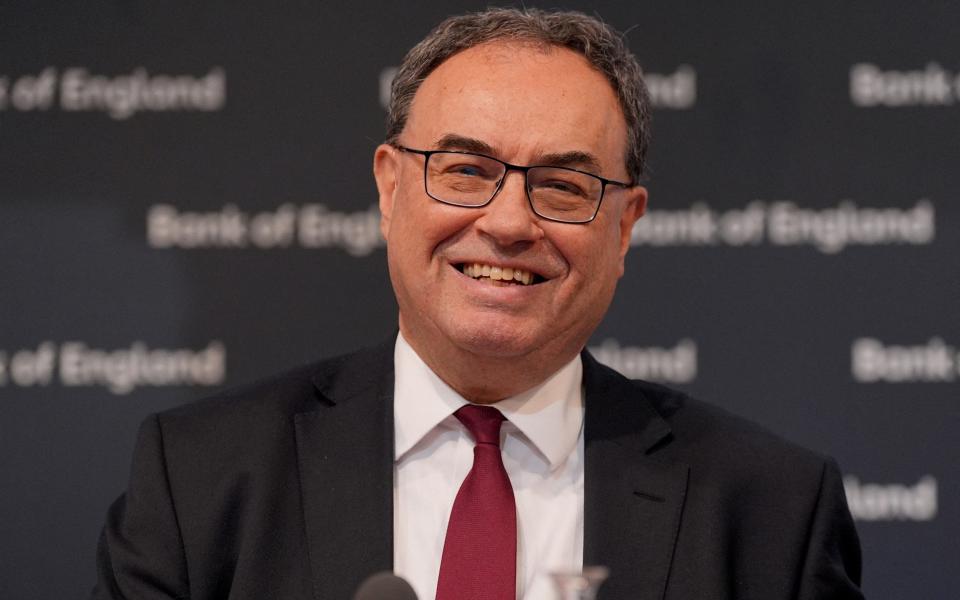
08:54 AM BST
GSK sells last remaining stake in Haleon for £1.2bn
GSK has raised £1.2bn after offloading its last remaining stake in Sensodyne and Advil maker Haleon, nearly two years after spinning off the consumer healthcare business.
GSK sold the final shares in Haleon at 324p each, ending a gradual sell-down of its holding in the company.
It has raised about £3.9bn in total from the stake sales, which first began in May last year.
GSK said:
Following settlement of the placing, GSK will have fully exited its position and will no longer hold any ordinary shares in Haleon.
GSK’s exit of its position in Haleon is consistent with its previous commitments to monetise its holding in a disciplined manner.
Haleon was formed in 2019 by the merger of the consumer healthcare businesses of British pharmaceutical group GSK and US rival Pfizer, sitting as a joint venture within GSK.
It was then spun out of GSK as a standalone business listed on the London Stock Exchange in July 2022.
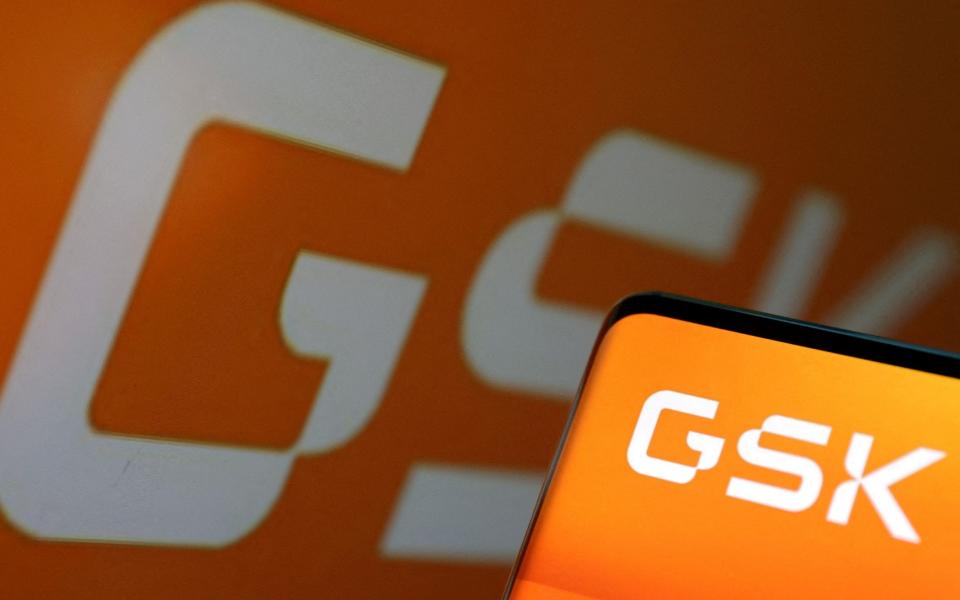
08:37 AM BST
FTSE 100 inches down after rally
The FTSE 100 edge down as investors await comments from Bank of England rate setter Catherine Mann later this morning.
The blue-chip index was 0.1pc lower but was set for a fourth weekly gain. The midcap FTSE 250 index was also down 0.1pc.
The pound was little changed against the dollar at $1.267.
Personal goods shares led the gains, led by 2.7pc jump in shares of Watches of Switzerland after it published an upbeat outlook for the year ahead on Thursday.
Investors will closely monitor comments from Catherine Mann, a member of the Monetary Policy Committee which sets interest rates, to see how soon the Bank of England could start easing borrowing costs.
Money markets have priced in at least two quarter of a point interest rate cuts in 2024, with the first cut expected by August.
GSK slid 0.67 after the drugmaker raised £1.2bn from selling its entire remaining stake in consumer healthcare firm Haleon, whose shares fell 0.6pc.
Auto Trader Group slipped 4.4pc to the bottom of FTSE 100 after Morgan Stanley cut its rating and target price on the stock.
08:24 AM BST
French unemployment remains at 7.5pc
Frances’s unemployment rate held firm at 7.5pc during the first three months of the year, official statistics show, in a setback for Emmanuel Macron.
France’s leader has made tackling French unemployment a yardstick for measuring the success of his presidency.
The country’s jobless rate has been creeping up in the last year, after touching around a four-decade low of 7.1pc in early 2023.
This week, official figures showed unemployment in the UK reached 4.3pc in the first quarter of this year.
The unemployment rate in France stood at 7.5% in the first quarter of 2024, unchanged for the third-quarter period and compared to market consensus of 7.4%. https://t.co/0FNZ5op7u6 pic.twitter.com/GG3RVG9xF3
— TRADING ECONOMICS (@tEconomics) May 17, 2024
08:10 AM BST
UK markets fall at the open
Stock markets were subdued as trading began in London after several Federal Reserve officials insisted that interest rates should stay higher for longer.
The FTSE 100 was flat at 8,436.13 while the midcap FTSE 250 edged down 0.1pc to 20,802.32.
08:02 AM BST
LandSec sees £625m wiped off property values
LandSec revealed more than £625m was wiped off the value of its office and retail sites as the commercial real estate sector grappled with high interest rates.
The UK’s largest commercial property developer and investor marked down the value of its portfolio by 6pc to £9.96bn in the year to the end of March.
Its London properties accounted for £449m of the writedown, driven by a 13.9pc drop in its City of London sites.
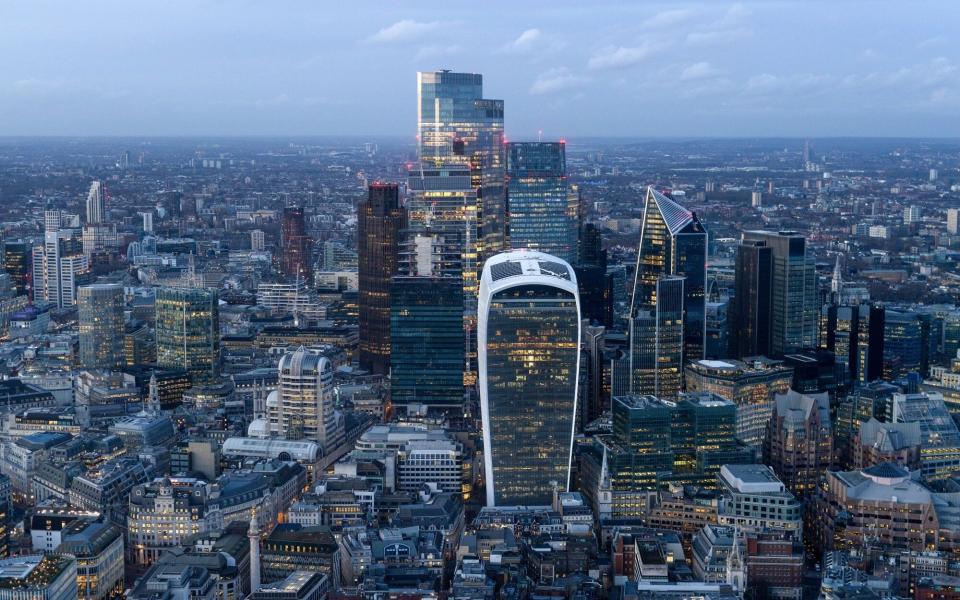
07:49 AM BST
Chinese house prices drop as property crisis deepens
China has announced a string of measures designed to rescue its beleaguered property market after house prices fell at their sharpest pace in a decade.
China’s central bank and regulators will allow local governments to buy “some” apartments, relax mortgage rules and pledge further efforts to deliver unfinished homes in some of their most sweeping changes yet.
It comes as fresh data showed the fastest drop in new home prices in China in more than nine years, highlighting the worsening state of an industry which at its peak accounted for a fifth of economic activity and remains a major drag on confidence and growth.
Consumers in China are grappling with the impact of a property market crisis, which investment bank Nomura estimated has left around 20 million abandoned or unfinished homes scattered across the country.
China’s key measure of consumer spending slowed down last month, national figures show, despite Beijing’s efforts to boost the economy.
Retail sales growth weakened to an expansion of 2.3pc in April, which was the slowest increase since December 2022.
It was down from 3.1pc in March and lower than forecasts.
Dan Wang, chief economist at Hang Seng Bank China, said the retail sales figures are “depressed by low consumer prices and further contraction in housing sales”.
07:21 AM BST
China scrambles to revive property market as prices slump
China’s slowing retail sector - seen as a key indicator of consumer spending power - has piled more pressure on Beijing to do more to support growth amid a property crisis that has gripped the nation.
Fresh data showed the fastest drop in new home prices in more than nine years, highlighting the worsening state of an industry which at its peak accounted for a fifth of economic activity and remains a key drag on growth.
In response, China’s central bank and regulators announced today they will cut the minimum down payment rate for first-time homebuyers to 15pc, according to state media, as authorities seek to reverse the downturn in the property market.
China also announced plans for local governments to buy “some” apartments and pledged forceful efforts to deliver unfinished homes.
It will also allow local government authorities to buy some homes at “reasonable” prices to provide affordable housing, Vice Premier He Lifeng told an online meeting on housing policy.
Elsewhere, China’s factory output topped forecasts in April, helped by improving external demand
Industrial output grew 6.7pc year-on-year in April, National Bureau of Statistics (NBS) data showed, accelerating from the 4.5pc pace seen in March and above the 5.5pc increase expected by analysts.
WOW! The #China real estate crisis just got worse. Chinese home prices dropped a staggering 0.94% in April, the second-biggest decline on record. Home prices have declined in 30(!) out of the last 33 months. China's housing market recession has been going on for nearly three… https://t.co/CqBTvx8QZl pic.twitter.com/DD530UVqgv
— jeroen blokland (@jsblokland) May 17, 2024
07:07 AM BST
Good morning
Thanks for joining me. We begin the day with figures showing retail sales unexpectedly slowed in China as and the property sector remained a drag on the economy and consumer spending.
China’s key measure of consumer spending slowed down last month, national figures show, despite Beijing’s efforts to boost the economy.
Retail sales growth weakened to an expansion of 2.3pc in April, which was down from 3.1pc in March and lower than forecasts.
Consumers in China are grappling with the impact of a property market crisis, which has seen Beijing step up a programme of bond sales in a bid to revitalise the economy.
President Xi Jinping has been grappling with a vast post-pandemic property crash after a debt-fuelled boom, which investment bank Nomura estimated has left around 20 million abandoned or unfinished homes scattered across the country.
Dan Wang, chief economist at Hang Seng Bank China, said the retail sales figures are “depressed by low consumer prices and further contraction in housing sales”.
“Business and consumer confidence will remain low without policy support directly targeting family income and durable goods.”
5 things to start your day
1) Rivals line up to take £1.6bn Navy contract from Titanic shipyard | Contingency plan for ship delivery comes amid fears Harland & Wolff could collapse
2) Nuclear waste to be buried 650ft under the English countryside | Underground storage fuels fears that radioactive waste could resurface
3) How Eurostar’s new trains will reignite a bitter Franco-German rivalry | French and German rivals face a competitive rerun for lucrative £2bn order
4) Boeing supplier cuts 450 jobs after losses fuelled by 737 blowout | Spirit AeroSystems faces scrutiny from regulators alongside Boeing following the January incident
5) Ben Marlow: The era of globalisation is about to come screeching to a halt | The engine of prosperity that has propelled growth since the Cold War is on its way out
What happened overnight
Asian stocks slipped after Federal Reserve officials suggested that interest rates may need to stay higher for longer even as inflation shows early signs of easing.
Data on Wednesday showed a slowdown in US consumer price inflation, which prompted markets to swiftly price in at least two rate cuts this year.
However, the excitement soon fizzled out as the latest report showed the labour market remains tight, while central bankers were still cautious about inflation.
MSCI’s broadest index of Asia-Pacific shares outside Japan was down 0.4pc after touching a two-year high on Thursday. The index was still set for an increase of 2pc this week for its fourth straight week of gains.
Japan’s Nikkei eased 0.3pc. China stocks fell, with the blue chip gauge down 0.2pc.
Hong Kong’s Hang Seng Index was the bright spot for Asia, touching its highest since August 2022. It was last up 0.3pc.
In New York, the Dow Jones Industrial Average of 30 leading US companies crossed the 40,000 level on Thursday for the first time.
It rose as high as 40,051.05 while the S&P 500 and Nasdaq also hit record highs in trading yesterday before slowly losing steam and finishing the day slightly lower.
Overall, the Dow Jones Industrial Average fell 0.1pc, to 39,869.38, the S&P 500 lost 0.2pc, reaching 5,297.12, and the Nasdaq Composite index fell 0.3pc, to 16,698.32.
The yield on the 10-year Treasury climbed to 4.38pc from 4.35pc late on Wednesday.

 Yahoo Finance
Yahoo Finance 